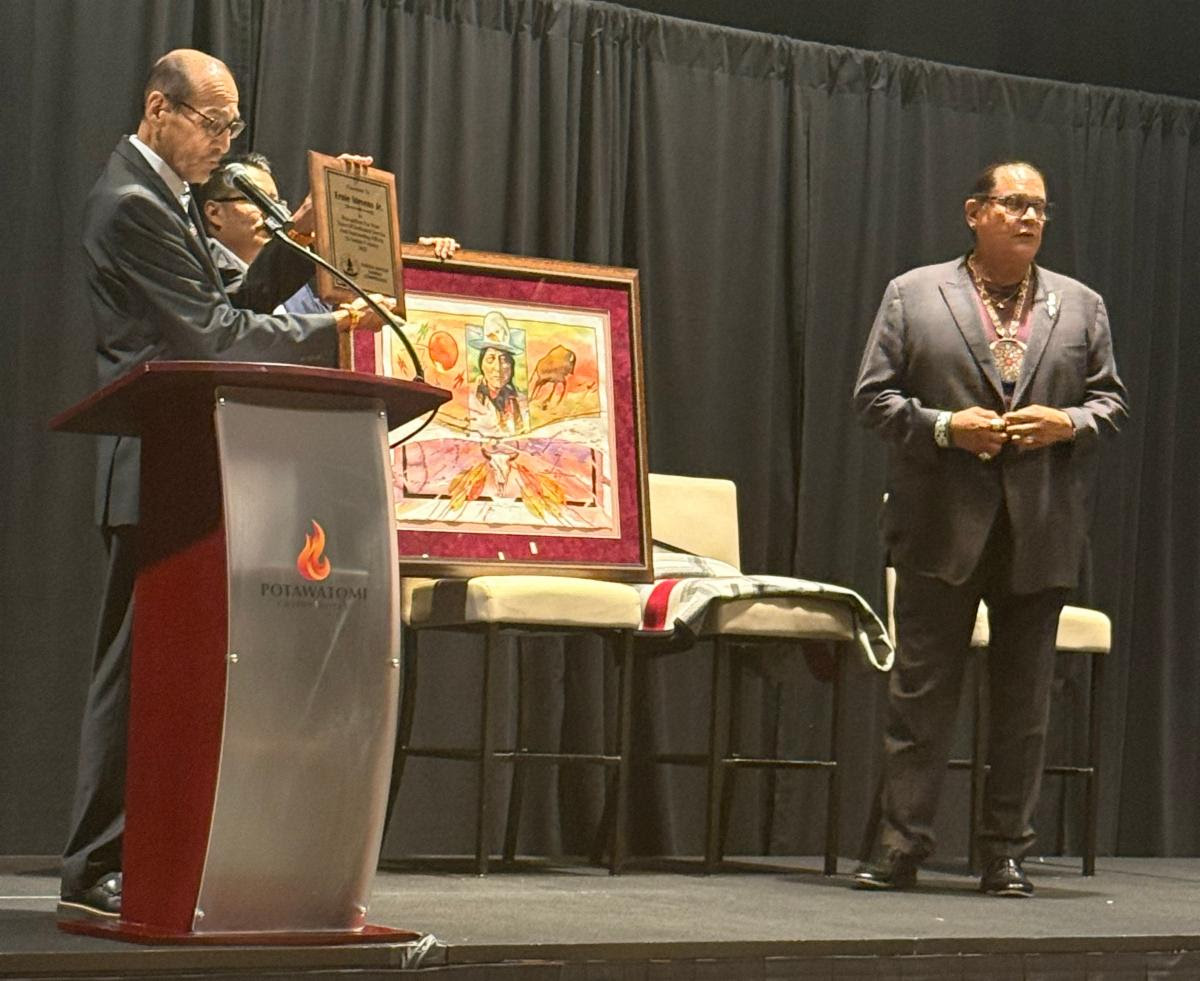
- Details
- By Native News Online Staff
At the Wisconsin Indian Gaming Regulatory Association (WIGRA) Conference on July 31, hosted at Potawatomi Casino in Milwaukee, the Oneida Gaming Commission recognized Indian Gaming Association Chairman Ernie Stevens, Jr. for his 24 years of leadership and service to tribal gaming. The tribute aligned with the release of the National Indian Gaming Commission’s (NIGC) 2024 fiscal year report, which highlighted a historic high in gross gaming revenues, totaling $43.9 billion across tribal gaming operations in the United States.
The event brought together tribal leaders, regulators, and industry professionals to celebrate Chairman Stevens’ enduring impact on tribal sovereignty, regulatory collaboration, and economic progress through Indian gaming. Under his guidance, the Indian Gaming Association has played a key role in fortifying the regulatory landscape and advancing initiatives that support tribal self-governance and prosperity.
The recognition was part of the WIGRA annual conference, which gathers representatives from Wisconsin’s eleven tribal gaming commissions to engage in discussions on regulatory practices, governance, and industry trends. This year’s agenda featured notable keynote speakers, including former NIGC Chairman Jonodev Chaudhuri and IGA Chairman Ernie Stevens, Jr.
Additionally, Sharon Avery, Acting Chairwoman of the NIGC, shared that tribal gaming achieved a new financial benchmark in Fiscal Year 2024, with gross revenues reaching $43.9 billion—a $2 billion increase from the previous year and a 4.6% growth overall. This achievement underscores the continued strength and economic significance of Indian gaming within tribal communities nationwide.
Gaming revenues remain a cornerstone of economic stability for many tribal nations, often accounting for up to 90% of total tribal government income. These funds are essential for delivering critical services such as healthcare, education, infrastructure, and community development—key drivers of self-determination and improved living conditions on tribal lands.
The 2024 NIGC report includes financial data from 532 tribally operated gaming facilities, representing 243 federally recognized tribes across 29 states. This breadth illustrates the wide-reaching impact and diversity of tribal gaming in the United States.
During his address at the conference, Chairman Ernie Stevens shared heartfelt appreciation for the recognition and underscored the progress tribal gaming has made over the years. He noted the sector’s continued expansion and its essential role in strengthening tribal communities.
Chairman Stevens also credited the industry’s success to the steadfast leadership of tribal governments, as well as the professionalism and integrity of gaming employees, regulators, and commissioners who uphold rigorous standards across operations.
Despite the momentum, he emphasized that much work remains ahead. With federal policymakers relying on current data to shape national policy, tribal leaders must remain proactive in defending their sovereign rights and advocating for policies that align with tribal priorities.
He also stressed the necessity of engaging decision-makers at all levels, ensuring they understand the unique role of tribal government gaming and the broader consequences of harmful regulatory changes—consequences that could extend well beyond the gaming floor and into essential community services.
In reaffirming his commitment, Chairman Stevens vowed to continue supporting tribal governments and championing their voices in national conversations. His message centered on unity, perseverance, and the shared responsibility of advancing tribal sovereignty through continued engagement and advocacy.
The celebration of Chairman Stevens’ leadership—paired with the historic revenue figures reported for 2024—marks a significant chapter for Indian gaming. As tribal nations confront ongoing political and regulatory challenges, their collective efforts to educate, advocate, and lead remain vital to securing long-term success and sovereignty for future generations.
More Stories Like This
Native News Weekly (August 25, 2024): D.C. BriefsUS Presidents in Their Own Words Concerning American Indians
Native News Weekly (February 15, 2026): D.C. Briefs
DHS Secretary Noem Tells Tribes ICE Does Not Target Native Americans
Native News Online Marks 15 Years of Warrior Journalism
Help us defend tribal sovereignty.
At Native News Online, our mission is rooted in telling the stories that strengthen sovereignty and uplift Indigenous voices — not just at year’s end, but every single day.
Because of your generosity last year, we were able to keep our reporters on the ground in tribal communities, at national gatherings and in the halls of Congress — covering the issues that matter most to Indian Country: sovereignty, culture, education, health and economic opportunity.
That support sustained us through a tough year in 2025. Now, as we look to the year ahead, we need your help right now to ensure warrior journalism remains strong — reporting that defends tribal sovereignty, amplifies Native truth, and holds power accountable.
 The stakes couldn't be higher. Your support keeps Native voices heard, Native stories told and Native sovereignty defended.
The stakes couldn't be higher. Your support keeps Native voices heard, Native stories told and Native sovereignty defended.
Stand with Warrior Journalism today.
Levi Rickert (Potawatomi), Editor & Publisher


